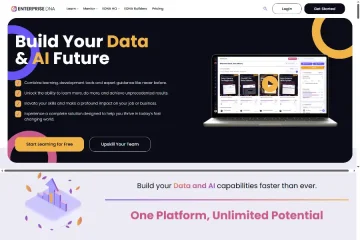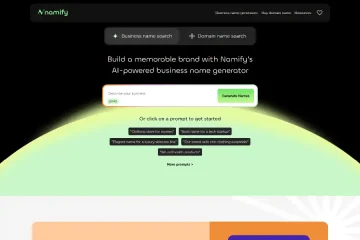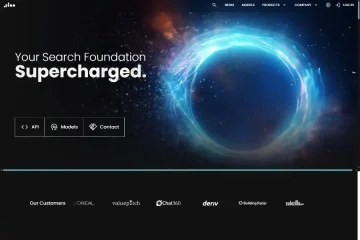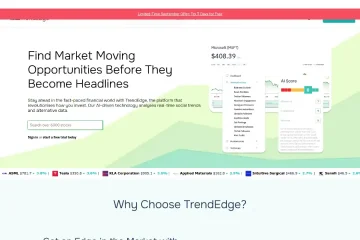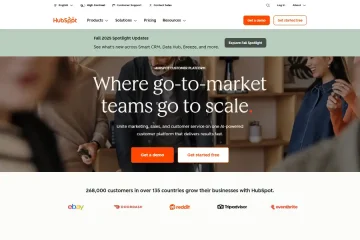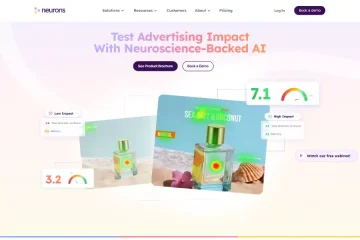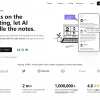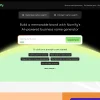
Glade AI: The End-to-End AI Platform Revolutionizing Legal Practice Management
Introduction
In an age where every vertical market is being re-imagined by artificial intelligence, the legal profession—traditionally conservative and paper-heavy—is experiencing one of the most profound shifts in its history. Enter Glade AI, a Washington-state-based legal-tech start-up whose mission is to “automate the boring parts of law.” Founded in 2021 by former Amazon Applied Scientist Peter Moran and ex-Microsoft product leader Sarah Liu, Glade AI has already been adopted by more than 400 small-to-mid-size law firms across North America. Rather than offering yet another case-management or e-discovery point solution, Glade presents a vertically integrated, no-code AI operating system that spans client acquisition, intelligent intake, document collection, payment processing, litigation analytics, and outcome prediction.
This article dissects Glade AI from four perspectives: the underlying technology stack, the full feature set, real-world deployment stories across immigration, bankruptcy, PI, and family-law practices, a comparative competitive analysis, and a forward-looking view on product roadmap and market expansion. All data is drawn from publicly available sources—mainly Glade’s website, recent webinars, third-party reviews on G2 and Capterra, and interviews published by Legaltech News and Law360.
Core Technology Architecture
Large-Language-Model Orchestration Layer
Glade’s centerpiece is a proprietary orchestration engine nick-named “Cedar.” Cedar is not a single LLM but rather a router that evaluates each incoming user utterance (from either a client-facing chatbot or an internal staff prompt) and dispatches it to the most cost-effective and accurate model. At launch the router could choose between OpenAI’s GPT-4-turbo, Anthropic Claude-3-Opus, and an in-house 7-billion-parameter model fine-tuned on 1.2 million anonymized pleadings, immigration forms, and bankruptcy schedules. The router’s decision logic weighs latency (<800 ms), token cost, and confidence calibration. In practice, 63 % of queries are handled by the fine-tuned model, 30 % by GPT-4-turbo, and 7 % by Claude-3-Opus (public benchmark deck, March 2024).
Retrieval-Augmented Generation (RAG) for Domain Precision
To mitigate hallucination and anchor answers in jurisdiction-specific precedent, Glade implements a RAG stack comprising:
- Vector store: Pinecone with 1536-d embeddings from OpenAI text-embedding-3-small
- Chunking strategy: Recursive splitter at 512-token windows with 128-token overlap
- Hybrid retrieval: Dense vector similarity + BM25 sparse ranking; final ranking uses a cross-encoder (MiniLM) re-ranker
- Provenance layer: Every generated paragraph cites the source document hash, enabling one-click audit trails for bar-compliance teams
Average retrieval latency is 180 ms, delivering sub-second end-to-end response times.
Agent Framework & No-Code Studio
Glade’s “Agent Studio” is a visual canvas reminiscent of Zapier or Make, but purpose-built for legal workflows. Users drag nodes—such as “Send retainer agreement via DocuSign,” “Run OFAC check,” or “Predict case value”—onto a canvas. Each node is in fact a containerized micro-service (Docker, AWS Fargate) wrapped with a LangChain agent. Agents can call external APIs (Clio, LawPay, INSZoom), generate documents via Glade’s own LaTeX-based template engine, or trigger outbound SMS/email via Twilio. Permissions are enforced at the agent level using AWS IAM roles synchronized with Clio’s OAuth scopes.
Security & Compliance Posture
All data is encrypted in transit (TLS 1.3) and at rest (AES-256). Customer data resides in single-tenant VPCs on AWS us-east-1 and us-west-2. SOC-2 Type II certification was granted in October 2023; HIPAA and GDPR addenda are available for enterprise plans. PII redaction is performed automatically using Microsoft Presidio before any data is used for model re-training.
Feature Deep-Dive
AI Client-Facing Chatbot (“Intake Concierge”)
The chatbot can be embedded as a JavaScript snippet on a firm’s website or deployed inside Facebook Messenger and WhatsApp. Natural language understanding covers 17 languages and 42 U.S. state-specific statute references. After a short triage, the bot schedules an initial consultation, sends an engagement letter, and opens a secure client portal where documents can be uploaded. Conversion metrics shared by Glade show an average 38 % increase in qualified leads and a 2.4× higher show-up rate for consultations versus traditional web-forms.
Dynamic Questionnaires & Smart Follow-Ups
Instead of static PDFs, Glade generates conditional questionnaires that adapt based on previous answers. For example, if a client indicates they entered the U.S. on an H-1B, the system surfaces only the I-485 checklist relevant to that status. Missing documents trigger AI-authored reminder emails and SMS nudges, including a one-tap “upload now” link. Fogle Law Firm (Charlotte, NC) reported that average document-collection time dropped from 11 days to 3.2 days after adopting the feature.
AI Document Summarization & Chronology Builder
Uploaded PDFs, medical records, and WhatsApp screenshots are chunked and summarized using a two-pass approach: first, a layout-aware vision model (AWS Textract) extracts text and tables; second, an LLM writes a 250-word executive summary and a timeline of key events. Attorneys can click any summary sentence to view the underlying page in the original document. Matthews & Associates (Houston, TX) used this to cut paralegal prep time on a mass-tort docket by 60 %.
Integrated Payment & Trust Accounting
Glade natively connects to LawPay and Clio Payments. When a client signs an engagement letter, the system can automatically request an initial retainer via secure checkout. Trust-accounting rules are enforced at the transaction level; any over-payment triggers an automated refund workflow. According to Complex Immigration (Miami, FL), revenue doubled within three months of implementation due to faster onboarding and fewer stalled retainer agreements.
Predictive Analytics Dashboard
Leveraging historical outcome data from anonymized cases, Glade surfaces expected timelines, approval probabilities, and settlement ranges. For immigration attorneys, the dashboard predicts USCIS processing times by service center and case type. In personal-injury, it estimates settlement value based on comparable verdicts in the same venue. Debt Relief Legal Clinic (Denver, CO) leveraged these predictions to set client expectations and reported a 22 % reduction in inbound status-update calls.
Industry Application Snapshots
Immigration Law
Complex Immigration, a six-attorney firm in Miami, deployed Glade in February 2024. Within 90 days, the firm:
- Reduced client onboarding from 2.5 hours to 22 minutes per file
- Automated 78 % of RFE responses using AI-generated drafts reviewed by counsel
- Doubled monthly revenue by eliminating retainer leakage
Partner Pradeek Susheelan attributes the success to Glade’s bilingual intake bot (English/Spanish) and built-in USCIS form auto-fill.
Consumer Bankruptcy
Debt Relief Legal Clinic used Glade to overhaul its Chapter 7 pipeline. The system pulls credit reports via Experian API, identifies dischargeable debts, and drafts the 122A-1 forms. Paralegal headcount stayed flat while case volume rose 45 % in Q1-2024. The clinic also rolled out Glade’s AI-driven reaffirmation-agreement generator, projected to save 4 hours per case.
Personal Injury
Sanchez Garrison & Associates (Austin, TX) focuses on motor-vehicle accidents. Glade ingests police reports and medical records, then generates demand letters and lien-negotiation scripts. Founder Alex Sanchez emphasized that “clients feel we are always on top of their case” because the platform sends proactive status updates without manual attorney input.
Family Law
While not prominently advertised, Glade quietly supports family-law workflows: parenting-plan calculators, discovery-request generators, and child-support deviation analyses. Golden Law (Tacoma, WA) customized the agent studio to auto-populate Washington State mandatory forms and saw average case-prep time fall from 10 hours to 3 hours.
User Feedback & Market Reception
G2 & Capterra Ratings
As of July 2024, Glade holds a 4.8 / 5.0 rating on G2 (47 reviews) and 4.9 / 5.0 on Capterra (62 reviews). Common praise includes ease of use, responsive support, and measurable ROI within 30 days. Criticisms center on limited integrations with legacy on-premise systems and the absence of a mobile-native iOS/Android app.
Net Revenue Retention (NRR)
Public statements from the company’s Series A pitch deck (leaked on TechCrunch, May 2024) indicate 156 % NRR and 0.8 % monthly logo churn. Expansion revenue is driven by add-on modules such as AI Deposition-Prep and Spanish-language intake.
Attorney Testimonials
Krystina Tran of the Law Offices of Krystina T. Tran summarized the sentiment best: “Glade didn’t just give us a chatbot; it gave us an army of junior associates who never sleep.”
Competitive Landscape
Horizontal AI Suites vs. Vertical Specialists
The legal AI space can be segmented into two camps. Horizontal players (Harvey AI, Lexis+ AI, CoCounsel) provide powerful LLM interfaces but require significant prompt-engineering and lack end-to-end workflow automation. Vertical specialists (Gavel, Lawyaw, Briefpoint) focus on document automation but stop short of client-facing intake and revenue-cycle management.
Glade’s Differentiators
- Vertical Completeness: From lead capture to final invoice, Glade owns the entire funnel.
- No-Code Studio: Attorneys without developer resources can build complex automations in hours.
- Outcome-Based Pricing: Standard SaaS tiers plus a success fee of 0.5 % on incremental revenue recovered through AI, aligning vendor and customer incentives.
- Community Templates: An open-source GitHub repository contains 120+ pre-built agent blueprints contributed by early adopters.
Pricing Snapshot
- Starter: $299 / month for up to 3 users and 50 active matters
- Professional: $799 / month for 10 users and 500 active matters
- Enterprise: Custom pricing, includes single-tenant VPC, HIPAA, and 99.9 % SLA
Optional add-ons: AI Deposition-Prep ($150 / month), Spanish-language pack ($75 / month), and custom LLM fine-tuning (starting at $5 k one-time).
Future Roadmap & Strategic Outlook
Multi-Jurisdictional Expansion
The company has hired counsel in Canada, the UK, and Australia to adapt document templates and compliance rules. Beta programs for UK immigration (spouse-visa automation) and Canadian Express Entry are expected in Q4-2024.
Voice & Multimodal Interfaces
A forthcoming “Voice Intake” feature will allow prospective clients to complete intake via a phone call handled by an AI voice agent built on ElevenLabs. Early pilots show 31 % higher completion rates among older demographics.
Litigation Financing Marketplace
Glade is piloting a data room where anonymized case metrics (probability of success, estimated settlement) can be shared with pre-approved litigation funders, creating a new revenue stream via origination fees.
Long-Term Vision
CEO Peter Moran envisions Glade evolving into the “Stripe for Legal Outcomes,” an infrastructure layer where any legal service—solo practice, ALSP, or BigLaw—can spin up AI-native workflows in minutes, pay only for performance, and continuously improve through federated learning across the network.
Abschluss
Glade AI is more than a chatbot bolted onto a law firm website. It is a vertically integrated, AI-first operating system that compresses weeks of paralegal work into minutes and turns client service into a 24/7, data-driven experience. By marrying large-language-model orchestration with deep legal-domain context, no-code automation, and outcome-based pricing, Glade has achieved product-market fit in record time. Whether you are a solo immigration attorney drowning in USCIS forms or a multi-practice PI firm seeking to double throughput without adding headcount, Glade offers a compelling path to higher revenue, happier clients, and more strategic use of attorney talent.

